- Home
- Parris Afton Bonds
Tame the Wildest Heart
Tame the Wildest Heart Read online
TAME THE WILDEST HEART
By
PARRIS AFTON BONDS
Published by Paradise Publishing
Copyright 2014 by Parris Afton, Inc.
All Rights Reserved
Cover artwork by Jerry Jackson
This is a work of fiction and a product of the author’s imagination. No part of this novel may be used or reproduced in any manner whatsoever without written permission except in the case of brief quotations embodied in critical articles and reviews. This eBook may not be re-sold or given away.
For my cousins, who share the Burns’ legacy
of Great-grandfather Albert ‘Kit’ McAlister’s epic tales ~
Brent, Dinah, Jeff, Kit, Kym, Marsha and Pam
The author wishes to express gratitude to
Dave Faust of the
Arizona Historical Society’s Fort Lowell Museum.
Author’s Note
My great-grandfather was an Indian scout under General Phil Sheridan, a cavalry hero of the Civil War and celebrated Indian fighter. Later in life, my great-grandfather owned a blacksmith shop and a corral in Tucson near Fort Lowell, where he had been mustered out. Among his incredible adventures on the frontier was his rescue of a white girl who had been taken captive by the Indians and who later wrote a book about it, mentioning my grandfather as one of her two rescuers.
At ninety-two, with an arrow-straight back, he was still performing saber drills. My grandmother’s door is nicked from those performances. As children, my mother and her brothers and their friends would listen spellbound to their grandfather’s spine-tingling stories about the Indians.
This story, then, is for my great-grandfather, Albert ‘Kit’ McAlister.
Parris Afton Bonds
§ CHAPTER ONE §
John Nester, a squaw man and interpreter for the Sixth Cavalry, went to draw a card from the deck. His finger and thumb did not even get the card off the stack, when another gambler’s knife whacked down a hair’s breadth from the deck.
“Ye sonofabitch, don’t cheat when ye play cards with me,” Mattie McAlister said.
All agreed that Mattie McAlister, nicknamed Cimarron, Spanish for wild one, was a living legend in southeastern Arizona. There were some who maintained that her leather pouch was a man’s testicle; that in the past she had actually severed fingers, and that she now carried those finger bones in her pouch.
She never said, and no one had the courage to ask.
The officers’ wives of Fort Lowell considered brown-eyed, brown-haired Mattie a wanton creature in the bargain. Could that be the reason the members of the recently formed Law and Order Society of nearby Tucson had neglected to extend an invitation for her to join their organization?
Her lips curled in a derisive smile. Before the astonished eyes of the other four players at the table, she rose, tucked her knife into the sheath strapped beneath her skirt at her thigh, and turned to walk out the swinging batwing doors of the saloon. Waiting outside, Reverend William “Buckskin” Bingham wasn’t exactly ignoring her.
The Mormon circuit rider pointed his long, bony finger at her as she drove Sam Kee’s buckboard out of Tucson’s red-light district backing up to Pennington Street. “Jezebel!” yelled the bearded man in the soiled blue kersey trousers and buckskin jacket. From the rattlesnake band of his floppy, black felt hat protruded a single eagle feather. “Whore! A fiery hell awaits fornicators like you!”
He, alone, seemed unafraid of her.
Few of the pedestrians, most of them at one time or another solicitors of the fleshy wares to be purchased in the red-light district, paid heed to the ranting, rambling man.
Certainly not thirty-year-old Mattie. Since arriving in Tucson four years earlier, back in ’78, she had armored herself with a solid steel shield of calculated indifference.
With a snap of the reins she nudged the two horses into a trot. They rounded the corner onto Meyer Street and headed for her once-a-week rendezvous at the Tombstone-Tucson stage depot. The sun was obscured by thin layers of gray, striated clouds. Another steaming day. May was a good month to bet on rain.
The buckboard, squeaking on its leather springs, squished along muddy ruts left by buggies and horses of the patrons of the Congress Hall Saloon. It was the most popular gaming place in Tucson. It reputedly had the largest mirror in the Territory, as well as the finest cigars and liquors. Mattie was one of the few females who could attest to the legitimacy of the claim.
The buckboard’s team of horses clip-clopped on past Major Huffstuttler’s wife, who was doubtlessly headed for the Tivoli Theater. Her operatic voice, as high as her bosom, was destined to entertain the territorial governor tomorrow night, according to the Arizona Weekly Citizen.
The May 19, 1882 edition lay folded on the slatted seat beside Mattie. The Personal Points column also announced that “Gov. J. C. Fremont has leased the residence of Mr. J. J. Hamburg on Main Street. Mrs. J. J. Hamburg leaves tomorrow morning for New York, accompanied by Mrs. Ed Hudson. They will spend the summer in the East.”
Mrs. Huffstuttler shook her closed umbrella at Mattie. “You . . . you vile beast!” Of course, she didn’t say it very loudly. Only loud enough to make herself feel brave. With a gloved hand she wiped furiously at her mud-splattered walking skirt.
The back of Mattie’s sun-cooked neck reddened. She popped the reins. The team broke into a faster gait, flicking clots of mud onto the nearby boardwalk.
At the stage depot, she hopped down from the running board. Her butternut-colored skirts caught on the break and exposed a length of high-top moccasin, rolled below the knee, before she tugged them loose.
Old Cyrus ambled out of the mud-bricked building. Seven thousand souls, damned and otherwise, were crowded into such houses in Tucson. Most had dirt floors and roofs that collapsed under hard rains. Hers was one of them.
“Howdy, Cimarron,” he shouted. He wore a faded derby hat to shade his eyes. Equally faded white hair hung from beneath the derby.
“G’day, Cyrus. The tea come in?” One never knew if the daily stage from Tombstone would arrive. The cast of characters who made forays on the gold- carrying Concord was magnificent, ranging from Chiricahua Apaches to ex-cavalrymen to Chinese coolies.
“Five bags,” he shouted.
She followed him into the storage shed beside the depot’s corral and its remuda of spent horses. Flies swarmed around the dung. “Any news of interest from Sin City?”
He put his ear trumpet to his ear. “What’s that you say?”
“Anything happening over in Tombstone?” she shouted again. Cyrus knew more gossip than the Personal Points columnist. But even he had never inquired about her leather pouch.
“Some fancy dude from back East arrived on the stage today,” he shouted back. “Said to have killed some man in a boxing match on a sandbar in the Rio Grande. He’s laying low, over in Gay Alley.”
Mattie hefted a twenty-five-pound burlap sack, its contents procured from Tombstone’s Chinatown. She was strong for one who looked so slight. “A better place he could not select.”
The amorous peccadillos and predilections of the Gay Alley section of Tucson far outdid anything Abilene or Tombstone had to offer.
Cyrus followed her to Sam Kee’s buckboard. “How’s your Albert?”
She tossed the tea sack into the wagon bed. “Hasn’t taken any scalp locks. Though I think his teacher isn’t convinced he won’t one day go renegade.”
“Lemonade, you say?”
With a chuckle, she turned to him. “No, tea. Come by for tea sometime, Cyrus. Compliments of Sam Kee.”
He waved, and she went on her way. Before leaving town, she stopped off at the Southern Pacific Railroad Depot to collect sacks o
f rice and sugar, imported from New Orleans.
Inside the new yellow depot, Mrs. Hamburg and her companion, Mrs. Hudson, awaited their train. By the big clock over the counter, it wasn’t due for another forty-five minutes, at 9:50 AM. She nodded at both women.
Mrs. Hamburg stared at her through the white Swiss veil of her toque hat and cooled herself with an ivory-and-lace fan that she brandished furiously. Mrs. Hudson whispered something behind a spotlessly white-gloved hand.
Mattie passed a blanketed Indian; a businessman sporting a huge gold chain that dangled across his flower-patterned vest; two fat, mantilla-draped Mexican women; and a bandy-legged man shod in cowhide boots. She continued on toward the freight counter.
The station master, Hiram, peering up at her from beneath his visor, slid the bill of lading under the window grill for her to sign. “Something else for you, too.”
“It came?”
He nodded. “Three days ago.”
With reverence she took the small, brown-paper- wrapped package he passed her. She had ordered the book by Sir Walter Scott for Albert. She hoped her nine-year-old son would enjoy the tale of the Scottish bandit, Rob Roy. Hoped even more she could give him a glimpse of the other half of his unusual heritage. Enough, at least, to whet his appetite for knowledge of the wide world stretching beyond the mudhole-and-sand oven that was Tucson.
After hefting the rice and sugar into the wagon bed, she then gave the horses their lead. They knew well the seven-mile drive to the fort and actually broke into a full gallop for that last quarter mile of Fort Lowell Road, lured by the hay and respite awaiting them at the stable behind Sam’s restaurant.
An adobe plastered over with lime stucco, the little restaurant was located on the road that ran behind the post. It had become a mecca for gourmet diners, military and civilian alike.
Old Sam Kee hailed from Canton in south China. He had toiled in the coolie labor camps of the Southern Pacific Railroad, where he had learned to cook. Not just line-camp slum-gullion but delicious things like pressed duck, wonton, egg foo-yong and other Chinese favorites cooked on the outdoor, open fireplace behind his adobe.
The little man greeted her at the restaurant door. Topping five feet including the thickness of his socks, he was not much taller than she. He was one of those lively types, always shifting, twisting, talking with his hands in the air. “Captain Jeter’s wife, she need you, missy.”
She carried the tea sack inside. A balloon ceiling of glue-stiffened, blue-checked cloth matched the restaurant’s tablecloths. Sam and she had plastered the walls with laundry bluing. Shot glasses on the tables served as candle holders. The small, terracotta pots of hot pink geraniums on each table had been her idea. “Mick’s been at it again?”
Sam’s short pigtail bobbed with his nod. The elements had wrinkled his skin, but his old eyes mirrored the soul’s inordinate dignity and the mind’s innate intelligence. “By looks of captain’s eyes, he drinky all the mescal in Gay Alley.”
“Anything short of sulfuric acid is tasteless to Mick Jeter.”
Weaving between tables, she put down the sack at the back of the room, near the tiny kitchen’s half-door, next to canned goods by cases: tomatoes, corn, peas, pickles, corned beef, condensed milk, even shellfish. “How bad is Jessica?” she asked.
“Bleeding at the nose. A few bruises. All hell break loose. You go. I’ll get other sacks.”
Taking a detour between the guard house and the adjutant’s office, she set out for her mud-brick shanty, just off the road into Tucson. She followed a path worn through salt grass and clover, purple-pink after the wet winter.
Her door was never locked because, quite simply, it wouldn’t. It was a converted pine table top she had rescued from a bonfire. She had turned out a resident burro to claim her shanty.
When she entered, she was, as always, enveloped by the subtle sweet aroma of snakeweed. Three years before, when repairing the roof, she had wedged the herb between the roof and the ceiling, which was made of small cottonwood timbers with the bark left on them and hard-packed dirt.
She put down the paper-wrapped book for Albert and collected her leather pouch of medicinal herbs. The pouch was never far from her bed, which was a Wabash bed built into the corner with only one post.
She was on her way out when an object on Albert’s rumpled bed caught her eye. He hadn’t taken his Olendorf’s Grammar Book to school with him.
She sighed. Old Miss Brayton would be pleased. The infraction would be just one more reason for her to request that Colonel Carr discharge the boy from school. After four years teaching a recalcitrant Albert, the spinster schoolmarm looked as if she required the services of a mortician.
Captain Jeter of the Twelfth Infantry, Company H, lived in adobe-and-pine-log quarters shaded by the cottonwoods that lined officers’ row. Mattie entered the back door to Jeter’s quarters. For Jessica’s sake, she could abandon her pride.
“Jessica?” she called out.
The answering moan drew her through the kitchen and down the wide, dark hallway to the bedroom. Jessica lay in the high tester bed, with her dark hair spilled over the sheets. Mattie sat down on the bed and, gently taking Jessica’s chin, turned the woman’s narrow face toward her. There was a bit of dried blood below her nose, and a tear seeped from the inner corner of one puffy eye.
Mattie drew opened her leather bag, stained and worn by years of use. “Looks like ye need to write back home to mamma, love.” Her voice was light, easy. It always was when her mind raged. Soft and very controlled. She wanted to kill men like this. She carried her own hatred for Nantez and his ilk bottled inside her. Sights like this uncorked the bottle.
“You toughed it out for . . . all those years,” Jessica whispered through swollen lips.
“Nantez didn’t have as easy access to liquor.” When the Apache subchief did, he would usually drink until he passed out, though not always. “Mind if I borrow your kitchen?”
The young woman shook her head and turned her face back to the wall.
Mattie found a bowl, a beautifully painted porcelain, one such as her mother had possessed, and dumped a handful of wheat bran, wormwood leaves, chamomile flower petals, the oil of roses, aniseed, clear lye of ashes, and pounded them together.
When they were well mixed, she took the bowl of paste back to the bedroom and sat down beside Jessica again.
“How do you . . . stand it?” the captain’s wife asked. “Everyone staring. Talking.”
“Is that what ye fear most? The talk? More than this? The beatings?”
She had learned that each person had her own private fears. Monsters, fears were, like the monster of Loch Ness. You might not see it, but that didn’t mean it wasn’t there.
Mattie herself wasn’t afraid of talk. Or beatings. Or even being alone. She was afraid of not liking herself, her real self. She was afraid of pulling the wool over her own eyes. In trying to be what she thought Mattie McAlister really was, was she denying what she had been? Or worse, denying herself the opportunity to be more?
She smeared a dab of the unguent on the lump on the woman’s forehead.
“If it wasn’t for Albert, you . . . could go East, where they didn’t know that—”
“—that I lived with the Indians for seven years? Sometimes, when I look at Albert, I think to meself, Mattie ye should have remained a virgin.”
“How can you . . . joke about such horrible things that happened when you were—oh, that smells awful, Mattie.”
“But it works miracles. By tomorrow morning, the officers’ wives will be exclaiming what a marvelous complexion ye have.” She stood up, her medicine bag in hand. “Ye really should see the doctor.”
“Doc Reilly is as big a drunk as Mick is. You know that.”
Doc Reilly, Tucson’s first doctor, had arrived two years earlier. One doctor to treat seven thousand people! He was competent when sober—and loose of lip. No secret was sacred with the rotund man.
Mattie took her leave and ret
urned to Sam Kee’s. Already a few diners had drifted in for the noon meal. Back in the kitchen, Sam greeted her with a concerned expression crinkling his parchment-paper skin. “Man out there, he asky for you, missy.”
“Ye don’t know him?” She tied on her apron, a bleached feed sack, over the brown-striped waist of her sturdy cotton and butternut skirt.
He shook his head. “No. He dressy like baritone in San Francisco Opera House.”
“I’ll see what he wants. Could I have a wee draught of tea, please, Sam?”
That was one thing Sam did as well as she, make a cup of tea. Oolong tea, no less! After Nantez had captured her, she had missed high tea and crumpets more than she had the luxuries of bed and bath.
She looked out through the half-door at the scattering of customers. Cyrus was sitting at the table nearest the cast-iron stove. Old Man Foster, owner of one of Tucson’s numerous saloons, was talking with Miss Dolly, who ran a boarding house. And Bishop Salpointe sat with Lieutenant Gil Wood.
Then she saw the other man. Sunlight, shining through the single shutter-framed window, revealed a man dressed more for the drawing rooms and salons of the world’s capitals than he was for that desolate, dirty backwash of the West.
His slightly crooked nose (evidently from a past break), scarred face, and brawny body clashed with the ruffled silk shirt and single, delicate gold earring. Long, dark, glossy hair framed a face that was a little too broad to be considered conventionally handsome. A drooping mustache graced his wide, sure mouth. His big, battered hands looked out of place, resting on the Malacca cane’s gold head.
So, this man had asked not for wonton but for the wanton, herself. He had to be new in town.
“Sam, kill the tea,” Mattie said. She plucked two glasses from the bamboo drying rack and grabbed up a whiskey bottle from the narrow shelf of brown liquor bottles.

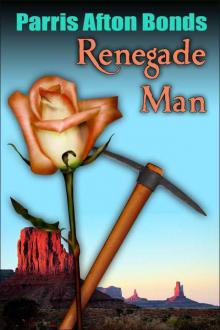 Renegade Man
Renegade Man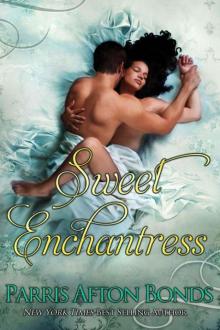 Sweet Enchantress
Sweet Enchantress Savage Enchantment
Savage Enchantment Mood Indigo
Mood Indigo Indian Affairs (historical romance)
Indian Affairs (historical romance)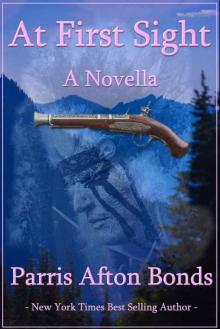 AT FIRST SIGHT: A Novella
AT FIRST SIGHT: A Novella The Maidenhead
The Maidenhead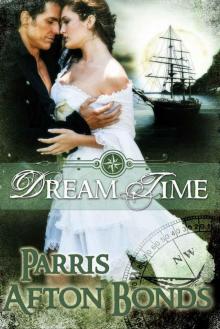 Dream Time (historical): Book I
Dream Time (historical): Book I Made For Each Other
Made For Each Other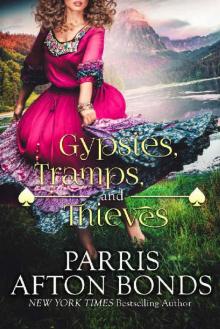 GYPSIES, TRAMPS, AND THIEVES
GYPSIES, TRAMPS, AND THIEVES Deep Purple
Deep Purple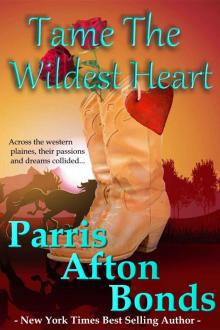 Tame the Wildest Heart
Tame the Wildest Heart LAVENDER BLUE (historical romance)
LAVENDER BLUE (historical romance)